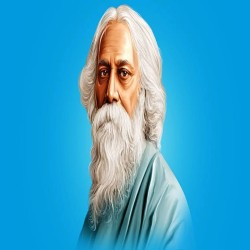
Rabindranath Tagore
| Date of Birth | : | 07 May, 1861 |
| Date of Death | : | 07 Aug, 1941 |
| Place of Birth | : | Jorasanko Thakurbari, Kolkata, India |
| Profession | : | Poet, Author, Polymath |
| Nationality | : | Indian, British Raj |
Rabindranath Tagore FRAS was a Bengali polymath who was active as a poet, writer, playwright, composer, philosopher, social reformer, and painter during the age of Bengal Renaissance. He reshaped Bengali literature and music as well as Indian art with Contextual Modernism in the late 19th and early 20th centuries. Author of the "profoundly sensitive, fresh and beautiful" poetry of Gitanjali, he became in 1913 the first non-European and the first lyricist to win the Nobel Prize in Literature. Tagore's poetic songs were viewed as spiritual and mercurial; where his elegant prose and magical poetry were widely popular in the Indian subcontinent. He was a fellow of the Royal Asiatic Society. Referred to as "the Bard of Bengal", Tagore was known by sobriquets: Gurudeb, Kobiguru, and Biswokobi.
A Bengali Brahmin from Calcutta with ancestral gentry roots in Burdwan district and Jessore, Tagore wrote poetry as an eight-year-old. At the age of sixteen, he released his first substantial poems under the pseudonym Bhānusiṃha ("Sun Lion"), which were seized upon by literary authorities as long-lost classics. By 1877 he graduated to his first short stories and dramas, published under his real name. As a humanist, universalist, internationalist, and ardent critic of nationalism, he denounced the British Raj and advocated independence from Britain. As an exponent of the Bengal Renaissance, he advanced a vast canon that comprised paintings, sketches and doodles, hundreds of texts, and some two thousand songs; his legacy also endures in his founding of Visva-Bharati University.
Family history
The name Tagore is the anglicised transliteration of Thakur. The original surname of the Tagores was Kushari. They were Pirali Brahmin ('Pirali' historically carried a stigmatized and pejorative connotation) who originally belonged to a village named Kush in the district named Burdwan in West Bengal. The biographer of Rabindranath Tagore, Prabhat Kumar Mukhopadhyaya wrote in the first volume of his book Rabindrajibani O Rabindra Sahitya Prabeshak thatThe Kusharis were the descendants of Deen Kushari, the son of Bhatta Narayana; Deen was granted a village named Kush (in Burdwan zilla) by Maharaja Kshitisura, he became its chief and came to be known as Kushari.
Works
Known mostly for his poetry, Tagore wrote novels, essays, short stories, travelogues, dramas, and thousands of songs. Of Tagore's prose, his short stories are perhaps the most highly regarded; he is indeed credited with originating the Bengali-language version of the genre. His works are frequently noted for their rhythmic, optimistic, and lyrical nature. Such stories mostly borrow from the lives of common people. Tagore's non-fiction grappled with history, linguistics, and spirituality. He wrote autobiographies. His travelogues, essays, and lectures were compiled into several volumes, including Europe Jatrir Patro (Letters from Europe) and Manusher Dhormo (The Religion of Man). His brief chat with Einstein, "Note on the Nature of Reality", is included as an appendix to the latter. On the occasion of Tagore's 150th birthday, an anthology (titled Kalanukromik Rabindra Rachanabali) of the total body of his works is currently being published in Bengali in chronological order. This includes all versions of each work and fills about eighty volumes. In 2011, Harvard University Press collaborated with Visva-Bharati University to publish The Essential Tagore, the largest anthology of Tagore's works available in English; it was edited by Fakrul Alam and Radha Chakravarthy and marks the 150th anniversary of Tagore's birth.Theft of Nobel Prize
On 25 March 2004, Tagore's Nobel Prize was stolen from the safety vault of the Visva-Bharati University, along with several other of his belongings. On 7 December 2004, the Swedish Academy decided to present two replicas of Tagore's Nobel Prize, one made of gold and the other made of bronze, to the Visva-Bharati University. It inspired the fictional film Nobel Chor. In 2016, a baul singer named Pradip Bauri, accused of sheltering the thieves, was arrested.Quotes
Faith is the bird that feels the light and sings when the dawn is still dark.
That side of our existence whose direction is towards the infinite that seeks not wealth, but freedom and joy.
I have spent a fortune travelling to distant shores and looked at lofty mountains and boundless oceans, and yet I haven’t found time to take a few steps from my house to look at a single dewdrop on a single blade of grass.
Death is not extinguishing the light; it is only putting out the lamp because the dawn has come.
Gray hairs are signs of wisdom if you hold your tongue, speak and they are but hairs, as in the young.
I slept and dreamt that life was a joy. I awoke and saw that life was service. I acted and behold, service was a joy.
Nirvana is not the blowing out of the candle. It is the extinguishing of the flame because day is come.
We read the world wrong and say that it deceives us. ― Rabindranath Tagore
The highest education is that which does not merely give us information but that makes our life in harmony with all existence. ― Rabindranath Tagore
The small wisdom is like water in a glass: clear, transparent, pure. The great wisdom is like the water in the sea: dark, mysterious, impenetrable.
